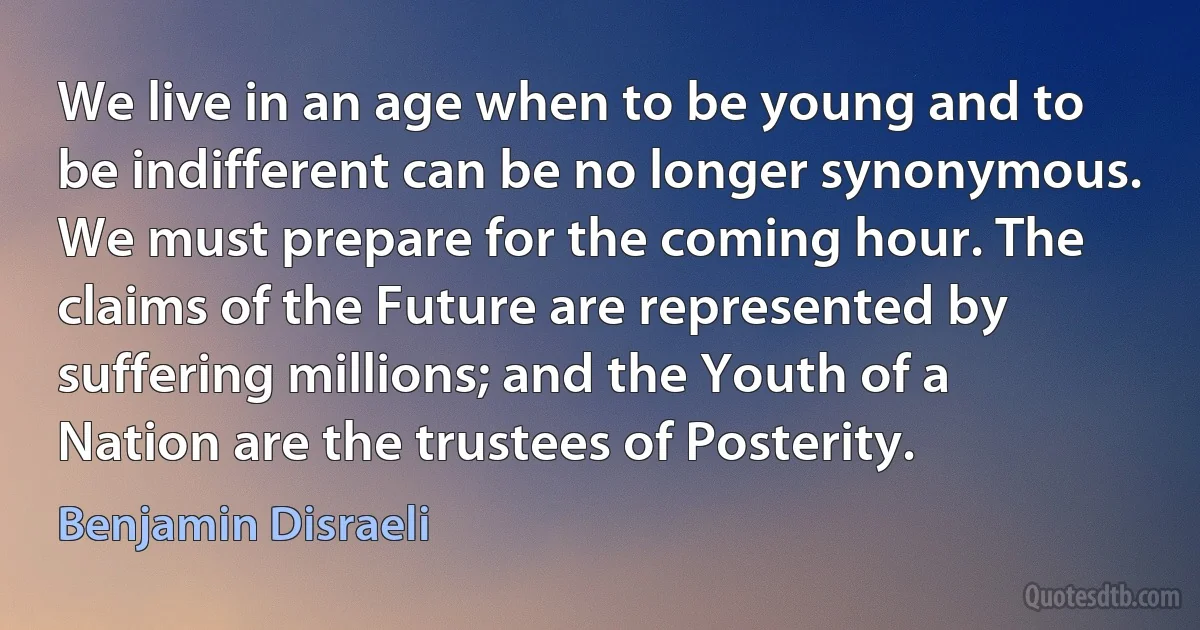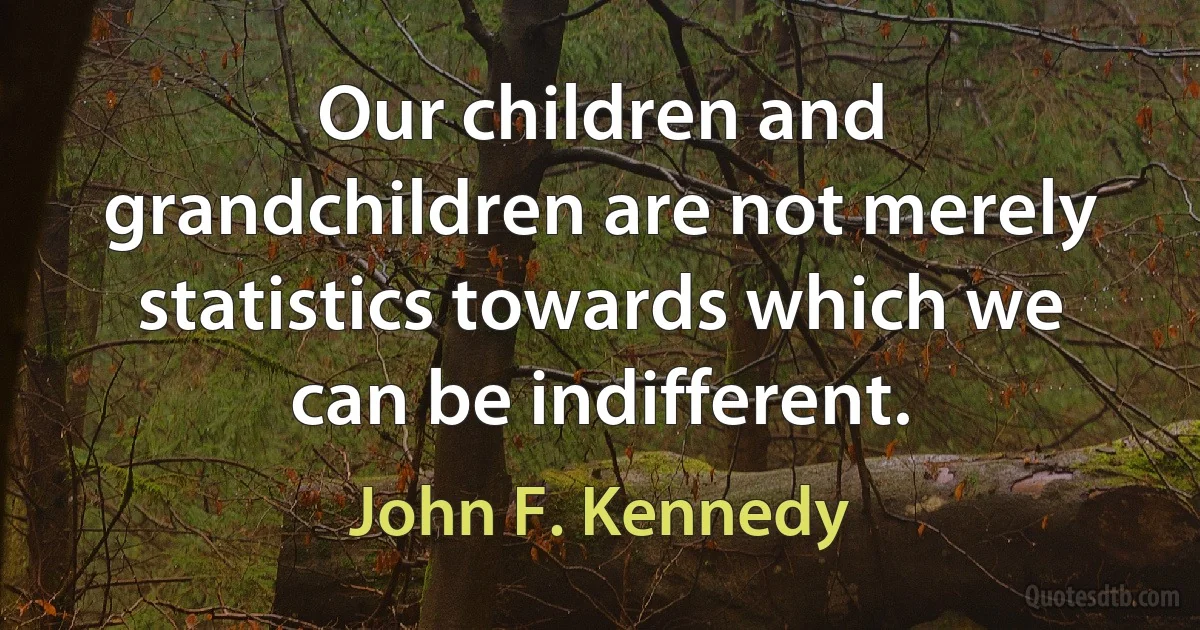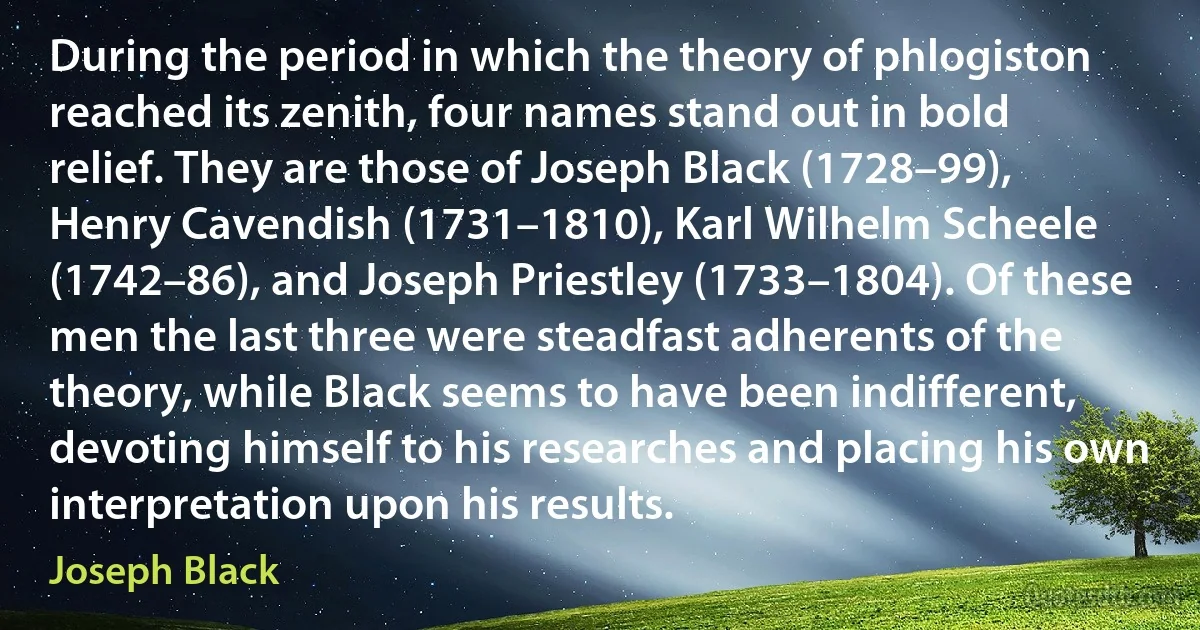Indifferent Quotes - page 16
These same institutions produce quite different effects while they are still being fought for; then they really promote freedom in a powerful way. On closer inspection it is war that produces these effects, the war for liberal institutions, which, as a war, permits illiberal instincts to continue. And war educates for freedom. For what is freedom? That one has the will to self-responsibility. That one maintains the distance which separates us. That one becomes more indifferent to difficulties, hardships, privation, even to life itself. That one is prepared to sacrifice human beings for one's cause, not excluding oneself.

Friedrich Nietzsche
Liberty, according to my metaphysics, is an intellectual quality; an attribute that belongs not to fate nor chance. Neither possesses it, neither is capable of it. There is nothing moral or immoral in the idea of it. The definition of it is a self-determining power in an intellectual agent. It implies thought and choice and power; it can elect between objects, indifferent in point of morality, neither morally good nor morally evil. If the substance in which this quality, attribute, adjective, call it what you will, exists, has a moral sense, a conscience, a moral faculty; if it can distinguish between moral good and moral evil, and has power to choose the former and refuse the latter, it can, if it will, choose the evil and reject the good, as we see in experience it very often does.

John Adams
far be it from me to say or insinuate a word of disparagement against such characters as Hampden, Elliot, Pym; whom I believe to have been right worthy and useful men. I have read diligently what books and documents about them I could come at;-with the honestest wish to admire, to love and worship them like Heroes; but I am sorry to say, if the real truth must be told, with very indifferent success! At bottom, I found that it would not do. They are very noble men, these; step along in their stately way, with their measured euphemisms, philosophies, parliamentary eloquences, Ship-moneys, Monarchies of Man; a most constitutional, unblamable, dignified set of men. But the heart remains cold before them.

Thomas Carlyle
There are few with whom I can communicate so freely as with Pope. But Pope cannot bear every truth. He has a timidity which hinders the full exertion of his faculties, almost as effectually as bigotry cramps those of the general herd of mankind. But whoever is a genuine follower of truth keeps his eye steady upon his guide, indifferent whither he is led, provided that she is the leader. And, my Lord, if it may be properly considered, it were infinitely better to remain possessed by the whole legion of vulgar mistakes, than to reject some, and, at the same time, to retain a fondness for others altogether as absurd and irrational. The first has at least a consistency, that makes a man, however erroneously, uniform at least; but the latter way of proceeding is such an inconsistent chimera and jumble of philosophy and vulgar prejudice, that hardly anything more ridiculous can be conceived.

Edmund Burke
The artefacts of a genius are distinguished by rich human content, for which he forges new images and new techniques, creates new styles. He sees himself as a unique eruption in the desert of the banal. He feels himself mysteriously inspired or possessed. The craftsman, on the other hand, is content to use the traditional materials and techniques. The more self-possessed he is, the better craftsman he will be. What pleases him is skill of execution. He is very concerned with his contemporary success, his market value. If a certain kind of political commitment is fashionable, he may be committed; but out of fashion, not conviction. The genius, of course, is largely indifferent to contemporary success; and his commitment to his ideals, both artistic and political, is profoundly, Byronically, indifferent to their contemporary popularity.

John Fowles
In this era of ubiquitous information, complexity, and intense scrutiny, it is becoming routine to respond to reports of character flaws in business, athletics, and politics with an indifferent shrug and a "Yes, but..." It's becoming easier to rationalize a lack of character by emphasizing accomplishments, as though this were a binary choice. It's becoming commonplace that character flaws are greeted with skepticism. In this environment, character matters even more. Building teams requires bringing together individuals with the right credentials, commitment, and character. A lack of any one of these will eventually mean trouble. Our teams- both leaders and followers- will and should be judged not only by what they accomplish but also by how. Neither leading nor following will be effective if personal interactions and beliefs are considered mere differences in perception. Rather, both leading and following require conviction and character.

Martin Dempsey
This habit of forming opinions, and acting upon them without evidence, is one of the most immoral habits of the mind. ... As our opinions are the fathers of our actions, to be indifferent about the evidence of our opinions is to be indifferent about the consequences of our actions. But the consequences of our actions are the good and evil of our fellow-creatures. The habit of the neglect of evidence, therefore, is the habit of disregarding the good and evil of our fellow-creatures.

James Mill
Something was in Debs, seemingly, that did not come out unless you saw him. I'm told that even those speeches of his which seem to any reader indifferent stuff, took on vitality from his presence. A hard-bitten socialist told me once, "Gene Debs is the only one who can get away with the sentimental flummery that's been tied onto Socialism in this country. Pretty nearly always it gives me a swift pain to go around to meetings and have people call me 'comrade.' That's a lot of bunk. But the funny part of it is that when Debs says 'comrade' it is all right. He means it. That old man with the burning eyes actually believes that there can be such a thing as the brotherhood of man. And that's not the funniest part of it. As long as he's around I believe it myself."

Eugene V. Debs
Men fear thought as they fear nothing else on earth – more than ruin, more even than death. Thought is subversive and revolutionary, destructive and terrible; thought is merciless to privilege, established institutions, and comfortable habits; thought is anarchic and lawless, indifferent to authority, careless of the well-tried wisdom of the ages. Thought looks into the pit of hell and is not afraid. It sees man, a feeble speck, surrounded by unfathomable depths of silence; yet it bears itself proudly, as unmoved as if it were lord of the universe. Thought is great and swift and free, the light of the world, and the chief glory of man.

Bertrand Russell
Instead of engaging in this rather boring academic exercise of opposing Spinoza and Levinas, what I want to accomplish is a consciously old-fashioned Hegelian reading of Spinoza - what both Spinozeans and Levinasians share is radical anti-Hegelianism. My starting hypothesis is that, in the history of modern thought, the triad of paganism-Judaism-Christianity repeats itself twice, first as Spinoza-Kant-Hegel, then as Deleuze-Derrida-Lacan. Deleuze deploys the One-Substance as the indifferent medium of multitude; Derrida inverts it into the radical Otherness which differs from itself; finally, in a kind of "negation of negation," Lacan brings back the cut, the gap, into the One itself. The point is not so much to play Spinoza and Kant against each other, thus securing the triumph of Hegel; it is rather to present the three philosophical positions in all their unheard-of radicality - in a way, the triad Spinoza-Kant-Hegel does encompass the whole of philosophy.

Baruch Spinoza
Perhaps the most wrenching by-product of the scientific revolution has been to render untenable many of our most cherished and most comforting beliefs. The tidy anthropocentric proscenium of our ancestors has been replaced by a cold, immense, indifferent universe in which humans are relegated to obscurity. But I see the emergence in our consciousness of a Universe of a magnificence, and an intricate, elegant order far beyond anything our ancestors imagined. And if much about the Universe can be understood in terms of a few simple laws of Nature, those wishing to believe in God can certainly describe those beautiful eyes to a Reason underpinning all of Nature. My own view is that it is far better to understand the Universe as it really is than to pretend to a Universe as we might wish it to be.

Carl Sagan



